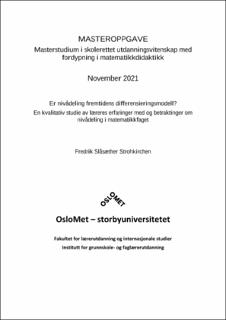| dc.contributor.advisor | Fadum, Aleksandra Hara | |
| dc.contributor.advisor | Kleve, Bodil | |
| dc.contributor.author | Strohkirchen, Fredrik Slåsæther | |
| dc.date.accessioned | 2022-02-09T13:05:50Z | |
| dc.date.available | 2022-02-09T13:05:50Z | |
| dc.date.issued | 2021 | |
| dc.identifier.uri | https://hdl.handle.net/11250/2978021 | |
| dc.description.abstract | Formålet med denne studien har vært å undersøke hvilke betraktninger lærere har om nivådelt undervisning i matematikk. Datamaterialet baserer seg på fire ungdomsskolelærere. Grunnlaget for oppgavens resultater bygger på deres erfaringer, refleksjoner og opplevelser rundt temaet. Oppgaven tar for seg faktorer som knytter seg til nivådeling som metode for differensiering, ved blant annet elevers mestringsforventning, selvoppfatning og sosiale sammenlikninger. For å undersøke dette har det blitt gjennomført en kvalitativ studie, hvor fire matematikklærere på ungdomsskolen ble intervjuet individuelt med en semistrukturert tilnærming. Datamaterialet ble analysert med Kirsti Malterud sin fire-stegs modell for analyse av meningsinnhold (Christoffersen & Johannessen, 2012). Videre ble de mest interessante funnene kategorisert, og videre drøftet i lys av relevant teori innenfor de samme kategoriene. Oppgaven tar for seg ulike faktorer knyttet til nivådelt undervisning. Den norske skolen er i dag preget ved tanken om at alle elever skal delta innenfor fellesskapets rammer, slik den nye læreplanen presiserer (Utdanningsdirektoratet, 2017). Funnene i oppgaven viser at det er store forskjeller ved hvordan lærere differensierer matematikkundervisning. De viser at det mangler en tydeligere lovgivning for nivådeling, hvor kriterier også bør innlemmes. Stigmatisering og vegring for matematikkfaget tyder også på å svekkes, dersom lærere bevisstgjør elevene om at det finnes flere faktorer knyttet til måloppnåelsen deres i matematikk. I kombinasjon med dette viser mine funn at elevers selvoppfatning og mestringsforventning varierer ut ifra hvilket ferdighetsnivå de har, og hvilken type differensiering de faller inn under. Avslutningsvis pekes det på forslag til videre forskning og oppgavens verdi. | en_US |
| dc.description.abstract | The purpose of this study was to examine which considerations teachers have about ability grouping in mathematics. The data is based on four junior high-school teachers. The foundation of the results is built on their experiences and reflections around the theme. The study looks at factors which relates to ability grouping as a form of adapting education, by student’s self-efficacy, self-perception, and social comparisons. To examine this, a qualitative study was conducted, where the teachers were interviewed with a semi structural approach. The data were analyzed with Kirsti Malterud’ content analysis (Christoffersen & Johannessen, 2012). The most interesting findings were categorized and discussed with relevant theory within the same categories. The study looks at different factors linked to ability grouping. The Norwegian schoolsystem has a strong emphasis on the idea that every student is a part of the same community practice, which the new curriculum also clarifies (Utdanningsdirektoratet, 2017). The findings shows that there are big differences in how teachers apply adaptive education in mathematics. The findings show that there is a deficiency in the law of education, where also criteria about how students should be grouped, should be incorporated. Stigmatization in mathematics is not as present, when teachers make students aware that there are a lot of factors connected to their goal achievement in mathematics. In combination with these findings, the study also shows that students self-perception and self-efficacy varies based on their skill level, and what kind of differentiation their school advocates. The conclusion discusses the value of the thesis and implications for further research. | en_US |
| dc.language.iso | nob | en_US |
| dc.publisher | OsloMet - Storbyuniversitetet | en_US |
| dc.subject | Differensiert undervisning | en_US |
| dc.subject | Nivådeling | en_US |
| dc.subject | Mestringsforventning | en_US |
| dc.subject | Selvoppfatning | en_US |
| dc.subject | Stigmatisering | en_US |
| dc.subject | Matematikkangst | en_US |
| dc.title | Er nivådeling fremtidens differensieringsmodell? En kvalitativ studie av læreres erfaringer med og betraktinger om nivådeling i matematikkfaget | en_US |
| dc.title.alternative | Is ability grouping the next differentiation model? A qualitative study of teachers’ experiences and perceptions about ability grouping in mathematics | en_US |
| dc.type | Master thesis | en_US |
| dc.description.version | publishedVersion | en_US |
| dc.source.pagenumber | 114 | en_US |
| dc.subject.nsi | VDP::Samfunnsvitenskap: 200::Pedagogiske fag: 280::Fagdidaktikk: 283 | en_US |
